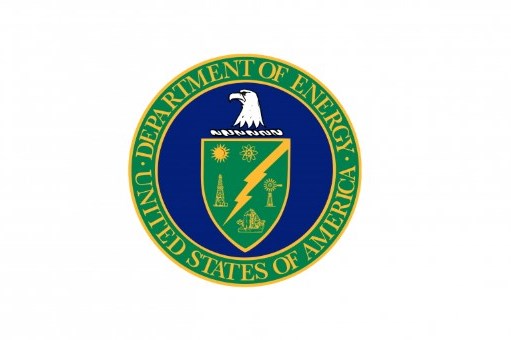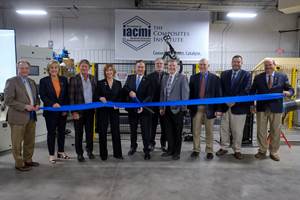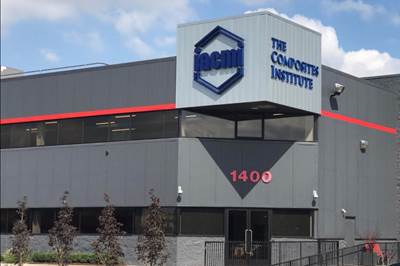IACMI collaboration aims to develop carbon fiber for hydrogen storage tanks
The $2.7 million U.S. Department of Energy funding supports the vision for affordable hydrogen production, storage distribution and use.
Share
Read Next

Source | IACMI
The Institute for Advanced Composites Manufacturing Innovation (IACMI, Knoxville, Tenn., U.S.) learned it will receive $2.7 million from the U.S. Department of Energy (DOE) to develop and validate technology that will reduce the cost of manufacturing high-performance carbon fiber by 25% to make composite natural gas or hydrogen fuel tanks to power cars and trucks. The news came in a DOE announcement July 20.
Throughout IACMI’s first five years of funding, the Manufacturing USA institute has focused one of its technology areas on compressed gas storage (CGS) tanks, making headway in innovations of materials and processes that lead to wider adoption of the technology in novel applications.
“Validating the use of low-cost, high-strength carbon fiber for compressed hydrogen and natural gas storage tanks will help expand technology choices for ground transportation,” says IACMI CEO John Hopkins. “Significant cost reduction is especially difficult for the type of carbon fiber used in CGS tanks and this project addresses that challenge.”
Hopkins says that while composite fuel tanks are lighter than other options, they have also been relatively expensive. Well over half of the composite fuel tank’s cost is said to be attributed to carbon fiber used in its manufacture. However, notes IACMI, reducing the cost of making carbon fiber will also lower the cost of composite fuel tanks making them a viable alternative to improve storage options and with no reduction of fuel tank performance.
The new award is one of 18 projects and approximately $64 million in DOE funding that will support the H2@Scale vision for affordable hydrogen production, storage, distribution and use. Four of the 18 projects focus on composite fuel tanks. The projects will support the next round of research, development and demonstration (RD&D) activities under H2@Scale’s multi-year initiative to fully realize hydrogen’s benefits across the economy.
The DOE says it will fund the projects through its Office of Energy Efficiency and Renewable Energy’s (EERE) Hydrogen and Fuel Cell Technologies Office. The projects will feature collaborations with EERE’s Advanced Manufacturing Office to manufacture reliable, affordable electrolyzers and with EERE’s Vehicle Technologies Office to develop low-cost, high-strength carbon fiber for hydrogen storage tanks.
Hopkins said in addition to advancing carbon fiber technology for CGS tanks, the project will validate how collaboration by industry, government and academia partners advances composites innovation, by driving smarter manufacturing practices and creating capacity and related expertise impactful for U.S. manufacturers.
For this project, IACMI notes that it will leverage its consortium network of partners:
- Prescott Composites (San Diego, Calif., U.S.), will validate the melt spinning and carbon fiber production technologies at a U.S. site to be selected during the project.
- JR Automation (Holland, Mich., U.S.) will design and fabricate the melt processing equipment at its facility in Nashville, Tenn., U.S.
- Hexagon R&D (Lincoln, Neb., U.S.) will fabricate and test composite fuel tanks.
- High Energy Sales (Charlotte, N.C., U.S.) will provide technical support on equipment and process design, operation, maintenance and troubleshooting.
- Oak Ridge National Laboratory (ORNL, Oak Ridge, Tenn., U.S.) will develop and scale the melt spinning process and heat treatment protocol. Carbon fiber for tank fabrication and testing will be produced at the DOE’s carbon fiber technology facility at ORNL.
- Virginia Tech, whose main campus is in Blacksburg, Va., U.S. will provide chemistry support on polyacrylonitrile, also called PAN, polymer formulation and testing.
Read the full DOE announcement here.
Related Content
IACMI receives funding renewal from U.S. DOE to continue composites R&D
Over the next five years, IACMI aims to further composites R&D efforts to support U.S. decarbonization and its pillars: technology, economy and workforce development.
Read MorePeople in composites: April 2023
Concordia Engineered Fibers, Nawa Technologies, IACMI, Joby Aviation and Akarmak America have made new personnel announcements in April 2023.
Read MoreRead Next
DOE announces funding for projects supporting composites for vehicle applications
Composite recipients Ford and GM will develop a multi-functional cross-car beam and volume manufacturing of structural battery enclosures.
Read MorePlant tour: Daher Shap’in TechCenter and composites production plant, Saint-Aignan-de-Grandlieu, France
Co-located R&D and production advance OOA thermosets, thermoplastics, welding, recycling and digital technologies for faster processing and certification of lighter, more sustainable composites.
Read MoreAll-recycled, needle-punched nonwoven CFRP slashes carbon footprint of Formula 2 seat
Dallara and Tenowo collaborate to produce a race-ready Formula 2 seat using recycled carbon fiber, reducing CO2 emissions by 97.5% compared to virgin materials.
Read More
























